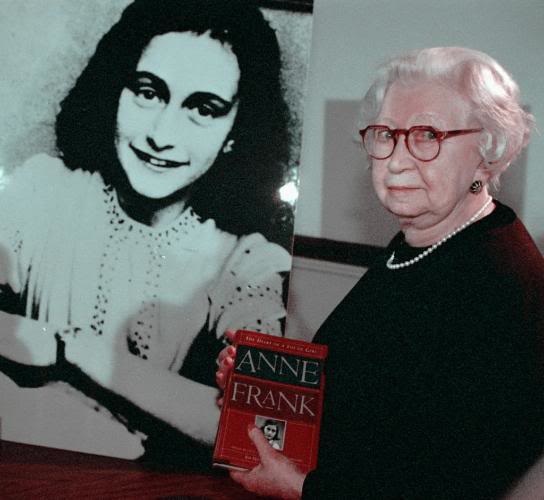‘Not a day goes by that I do not grieve for them’
MIEP GIES
Dead at 100
Hid Anne Frank and others from Nazis
Saved Anne Frank’s writingsMiep Gies, the woman who hid Anne Frank during World War II and then rescued Frank's diary after the Frank family's arrest by Nazis, died on January 11 in an nursing home after suffering a fall in December. She was 100 years old. Conspiring with her husband and three other friends, Gies hid Frank, Frank's family, and four other Jews in an attic an Amsterdam for 25 months. They were arrested on August 4, 1944; when Frank's father—the sole survivor of the group—returned following the war, Gies presented him with his daughter's diary.
"I am not a hero," Mrs. Gies wrote in her 1987 memoir, Anne Frank Remembered. "I stand at the end of the long, long line of good Dutch people who did what I did and more—much more—during those dark and terrible times years ago, but always like yesterday in the heart of those of us who bear witness.
"Not a day goes by that I do not grieve for them," she added.
It wasn't only the Frank family that was hidden from the Nazis by Mrs. Gies, her husband and their friends, who secreted their Jewish friends in rooms behind a moveable bookcase in an annex to the business run by Anne's father, Otto Frank. Four Dutch Jews, the van Pels (the father was a business colleague of Otto Frank's) and Mrs. Geis's dentist, Fritz Pfeffer, were also hidden in the annex. Anne's diary and other writings that were left behind were gathered up and saved by Mrs. Gies, who hoped Anne would return one day to claim them. In addition to documenting the lives of and conflicts with her family and friends, and details of the family's time in hiding, Anne's writings revealed her ambitions to be a writer: And if I don't have the talent to write books or newspaper articles, I can always write for myself. ... I need to have something besides a husband and children to devote myself to! ... I want to be useful or bring enjoyment to all people, even those I've never met. I want to go on living even after my death! And that's why I'm so grateful to God for having given me this gift, which I can use to develop myself and to express all that's inside me! When I write I can shake off all my cares. My sorrow disappears, my spirits are revived! But, and that's a big question, will I ever be able to write something great, will I ever become a journalist or a writer?
Anne Frank died at the Bergen-Belsen concentration camp three months shy of her 16th birthday; her mother, Edith Frank, and 19-year-old sister, Margot, died at Auschwitz. Father Otto Frank was liberated at Auschwitz. Mrs. Gies returned Anne's writings to her father, and they were first published in an abridged version in the Netherlands in 1947; it was translated and published in English in 1952 as The Diary of a Young Girl.
The only known footage of Anne Frank, leaning out of a window in her house in Amsterdam, watching a bride and groom depart after their wedding. She is first seen at the 0:10 mark.In her memoir, Mrs. Gies revealed her conflicted emotions upon finally reading Anne's diary. "The emptiness in my heart was eased," she wrote, adding: "So much had been lost, but now Anne's voice would never be lost. My young friend had left a remarkable legacy to the world.
"But always, every day of my life, I've wished that things had been different. That even had Anne's diary been lost to the world, Anne and the others might somehow have been saved."
In an interview with the Scholastic website in 1997 (http://teacher.scholastic.com/frank/tscripts/miep.htm), students had a chance to ask Miep Gies questions about her experiences with Anne Frank and with the Nazis in WWII. One asked: “What message should the young people of today pass on about Anne’s story?” Her answer in full:
The message to take from Anne's story is to stop prejudice and discrimination right at its beginning. Prejudice starts when we speak about THE Jews, THE Arabs, THE Asians, THE Mexicans, THE Blacks, THE Whites. This leads to the feeling that all members of each such group think and act the same. That results in prejudice. Lumping entire groups of people together is RACISM, because it denies the fact that everyone is an individual. Even our own brothers and sisters or parents are not exactly like we are. So how do we dare to lump entire groups of people together? If any German had ever asked Anne to tell something about herself, I think she would be still with us today. However, nobody asked: she was just a Jew! Therefore, never base your opinion about anybody else on the color of that person's skin, or on the passport that a person carries, or on the family that person comes from, but only on what the person says and does and on NOTHING ELSE.
Founder/Publisher/Editor: David McGee
Contributing Editors: Billy Altman, Laura Fissinger, Christopher Hill, Derk Richardson
Logo Design: John Mendelsohn (www.johnmendelsohn.com)
Website Design: Kieran McGee (www.kieranmcgee.com)
Staff Photographers: Audrey Harrod (Louisville, KY; www.flickr.com/audreyharrod), Alicia Zappier (New York)
E-mail: thebluegrassspecial@gmail.com
Mailing Address: David McGee, 201 W. 85 St.—5B, New York, NY 10024


